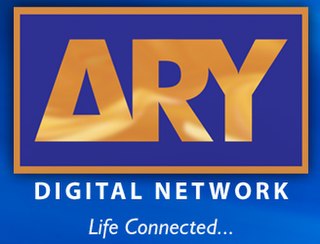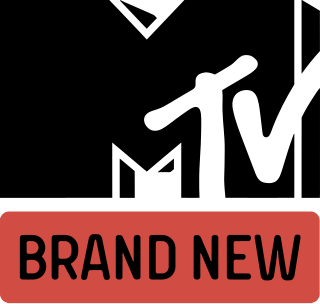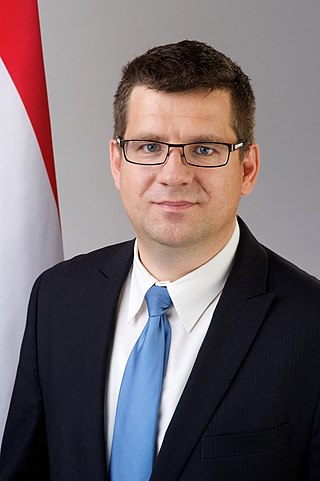
Magyar Televízió or MTV is a nationwide public television broadcasting organization in Hungary. Headquartered in Budapest, it is the oldest television broadcaster in Hungary and today airs five channels: M1 HD, M2 HD, M3, M4 Sport and M5.

Viktor Mihály Orbán is a Hungarian politician who has served as prime minister of Hungary since 2010, previously holding the office from 1998 to 2002. He has presided over Fidesz since 1993, with a brief break between 2000 and 2003.

The Christian Democratic People's Party is a right-wing Christian democratic political party in Hungary. It is officially a coalition partner of the ruling party, Fidesz, but is mostly considered a satellite party of Fidesz. The party has been unable to get into the Parliament on its own since the 1990s, as it was not able to pass the election threshold of 5% of the vote. Without Fidesz, its support is now low enough that it can no longer be measured, and even a leading Fidesz politician, János Lázár, stated that Fidesz does not consider the government to be a coalition government.
RTL is a Hungarian free-to-air television channel owned by RTL Group.

Hír TV is a Hungarian television news channel, the first of such made in the country. It began broadcasting on 2 January 2003.

ARY Digital Network is a subsidiary of the ARY Group. The ARY group of companies is a Dubai-based holding company founded by a Pakistani businessman, Haji Abdul Razzak Yaqoob (ARY). The network has a video on demand streaming service called ARY ZAP.

Nap Televízió is a privately-owned producer of television programmes. It makes daily television programmes for Hungarian Television, called Nap-kelte (Sunrise). The company's first programmes appeared on-screen in 1989, and have run continuously ever since. Between 1999 and 2002 its programmes were broadcast by the privately owned TV3. After its bankruptcy, they moved to ATV. On September 25, 2009, the show was also discontinued on Hungarian Television channels 1 and 2 due to lack of funds.
Sándor Fábry is a Hungarian comedian, talk show host, and writer.

ATV is the first Hungarian private TV channel, broadcasting continuously since 1989, with a focus on news, public life, and current events. Licensed as a partially public service commercial television station, it is obliged to broadcast public interest programs 50% of the time. Because of this special status, the channel is eligible to apply for grants from the government and the radio and television authority. As of 2003 the owner of the channel is the Hungarian Faith Church. It is the first private TV channel in Hungary, being established in late 1989 and airing ever since.

Tamás Deutsch is a Hungarian politician and Member of the European Parliament (MEP) from Hungary. He is a member of Fidesz, part of the Non-Inscrits group. He was a member of the Hungarian Parliament between 1990 and 2009 and Minister of Youth Affairs and Sports between 1999 and 2002.
Beugró is a Hungarian short-form improvisational comedy TV show. The show's format is similar to the one of Whose Line Is It Anyway?. It was first aired on December 31, 2007 on TV2, but was not renewed after the first season. The Hungarian public service television and Comedy Central Hungary took Beugró over after its cancellation, but one year later they passed it to Cool TV. In 2011, Viasat 3 bought the rights to the show but stopped production after only one year. The last episode was aired on January 1, 2012. The show had a spring and a fall season each year. In late 2017, RTL II—one of Cool TV's sister channels—revived the series for a tenth anniversary season.

Echo TV was a Christian-conservative Hungarian television channel owned and operated by Echo Hungária TV Zrt, and founded in 2005 to cover business news. Later focusing on news broadcasting and public affairs, it was known as a supporter of Fidesz and KDNP.
Klubrádió is a commercial talk and news radio station based in Budapest, Hungary. Klubrádió is often labeled as the voice of the left-liberal opposition. Many on the right and far-right find it important to emphasize what they perceive as the political bias of Klubrádió by pointing to the fact that Klubrádió has hired a liberal politician as a host since 2008. The then-active SZDSZ MP, also former party chairman Gábor Kuncze was the Minister of Interior appointed by the liberal party, SZDSZ. Socialist Prime Minister Ferenc Gyurcsány also hosted once a program on Klubrádió while in office. Klubrádió was started broadcasting in April 1999, as the official radio of the Hungarian Auto Club (HAC). After HAC sold the station to Monográf Zrt, the original programming of the Auto Club changed, and the broadcast format was completely transformed into a talk and news station.

MTV Brand New was a 24-hour specialist music channel featuring new music videos, alternative and indie music available in the Netherlands. An Italian version of the channel launched on September 14, 2003. It also launched in Germany in 2011.

Miklós Seszták is a Hungarian jurist and politician. He served as Minister of National Development in Viktor Orbán's third cabinet from 2014 to 2018. He was elected Member of Parliament for Kisvárda, Szabolcs-Szatmár-Bereg County in 2010. He is one of the vice presidents of the Christian Democratic People's Party (KDNP).

Tamás Harle is a Hungarian journalist, author and media lecturer. As author, editor and publisher he worked on more than 20 books.
Top Gear is a British motoring magazine and factual television programme. It is a revival of the 1977–2001 show of the same name by Jeremy Clarkson and Andy Wilman for the BBC, and premiered on 20 October 2002. The programme focuses on the examination and reviewing of motor vehicles, primarily cars, though this was expanded upon after the broadcast of its earlier series to incorporate films featuring motoring-based challenges, special races, timed laps of notable cars, and celebrity timed laps on a course specially-designed for the relaunched programme. The programme drew acclaim for its visual and presentation style since its launch, which focused on being generally entertaining to viewers, as well as criticism over the controversial nature of its content. The show was also praised for its occasionally-controversial humour and lore existing in not just the automotive community but in the form of internet memes and jokes. The programme was aired on BBC Two until it was moved to BBC One for its twenty-ninth series in 2020.
Shine TV is a New Zealand Christian television channel operated by Rhema Media and broadcast on Freeview Channel 25 and Sky TV channel 201. The station promotes Christian lifestyles, traditional Christian values, Gospel teachings and interdenominational Christian unity. From its outset, it has focused primarily on children, young people and family audiences.

Fidesz–KDNP Party Alliance, formerly also known as the Alliance of Hungarian Solidarity, is a right-wing national conservative political alliance of two political parties in Hungary, the Fidesz – Hungarian Civic Alliance (Fidesz) and the Christian Democratic People's Party (KDNP). The two parties jointly contested every national election since the 2006 parliamentary election. The Fidesz–KDNP party alliance has governed Hungary since 2010, altogether obtaining a supermajority in each of the 2010, 2014, 2018, and 2022 national elections.
United for Hungary is a political alliance in Hungary that was formed to compete in the 2022 parliamentary election. The alliance lost the 2022 election.












